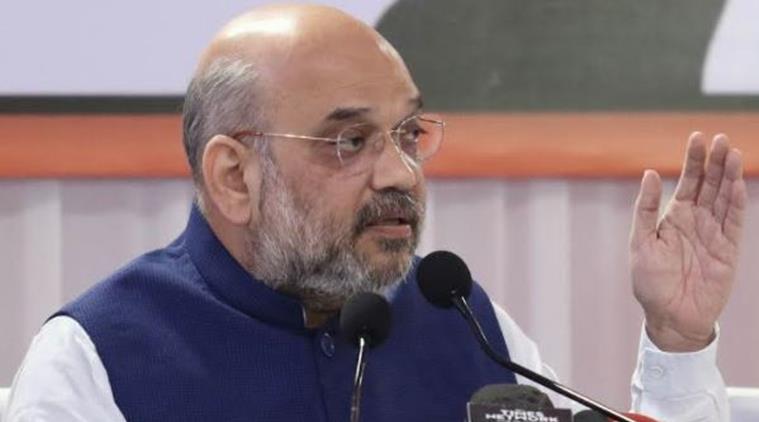 BJP president Amit Shah, in an interview to The Indian Express dismissed suggestions that the 2019 Lok Sabha polls may be advanced. (Express Photo/Prashant Nadkar/File)
BJP president Amit Shah, in an interview to The Indian Express dismissed suggestions that the 2019 Lok Sabha polls may be advanced. (Express Photo/Prashant Nadkar/File)
BJP president Amit Shah Tuesday dismissed suggestions that the 2019 Lok Sabha polls may be advanced and indicated that simultaneous elections may not be feasible next year since a political consensus is yet to be formed on the issue.
“No,” was Shah’s firm response to a question from The Indian Express on whether the BJP-led government was considering the option of advancing elections. The Lok Sabha elections are due next summer and there have been suggestions that they may be clubbed with a clutch of Assembly elections slated in Rajasthan, Madhya Pradesh and Chhattisgarh later this year, especially with Prime Minister Narendra Modi advocating simultaneous polls.
In an interview to The Indian Express, Shah said: “The PM has put forth an idea (of simultaneous elections) before the country. And he has welcomed a public debate on this. This issue will progress further only after a law is enacted and all parties extend support. The Election Commission will also have to hear it. Only then can this thing move forward.”
Shah said: “If all political parties unite tomorrow, it can be done tomorrow. It requires an amendment to the RP Act (The Representation of People Act), and it can happen only in Parliament. It cannot be done secretively.”
Dismissing suggestions of a fractured mandate in the Karnataka elections, Shah asserted that the BJP will form the next government in the state with a clear majority.
The BJP president also played down the latest political realignment in UP where arch rivals SP and BSP have closed ranks to challenge the BJP in 2019. He claimed that the BJP was aiming to bag a 50-per-cent vote share to ward off the challenge.
“There is not an iota of fear… We will contest this battle of 50 per cent and we will win it, too. Is baar bhi Delhi ka raasta Lucknow hokar jayega (Even this time, the road to Delhi will pass through Lucknow),” he claimed.
In an apparent attempt to distance his party and its government from the debate surrounding the Supreme Court Collegium, Shah dismissed fears of Justice Ranjan Gogoi, the next in line to head the apex court, being superseded after the retirement of Chief Justice of India Dipak Misra.
Responding to a query on apprehensions voiced in this context by Justice J Chelameswar, the second most senior judge, Shah said: “Yeh unka vyaktigat vichar hai. Sarkar ka vichar nahin hai (This is his personal view. This is not the view of the Government).”
Last month, asked at an event by Karan Thapar whether he feared that Justice Gogoi “might not be elevated to CJI when Justice Misra retires”, Justice Chelameswar had said: “I hope it will not happen. If, if, if, I repeat, if it happens, it will only prove whatever we said at the press conference is true.”
He was referring to the unprecedented press conference in Delhi on January 12, when he and three of his colleagues — Justices Gogoi, Madan B Lokur and Kurian Joseph — had released a letter in which they raised questions on the court’s functioning, particularly the allocation of cases by CJI Misra.
The BJP president, however, defended the Government’s move to seek reconsideration of the Collegium’s recommendation to elevate Uttarakhand Chief Justice K M Joseph to the Supreme Court.
“Many governments have returned (Collegium recommendations) in the past. This is a Constitutional right of an elected government. The procedure, as established by Supreme Court judgments, says that the Government is well within its right to send back names,” Shah said.
Rejecting the Opposition charge that political considerations were behind the Government rejecting the Collegium’s recommendation, Shah said: “Hum logon ne toh naam waapas bheja hai. Inke (Congress) samay mein toh istife hi ho gaye the, teen Supreme Court ke judges ke, Indiraben ke samay mein (We have only returned a name. In their time, three Supreme Court judges had resigned, during the time of Indira Gandhi).”
He was referring to the appointment of Justice AN Ray as the Chief Justice of India superseding three most senior judges — Justices J M Shelat, A N Grover and K S Hegde — in 1973 after which the three resigned immediately.